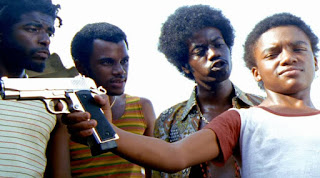On Saturday 12 March at 5:31 the Phnom Penh Film Club treats itself to one of the most ambitious and influential Brazilian pictures of all time, Fernando Mierelles’ gritty and operatic 2002 chronicle of life in the favelas of Rio, *City of God*.
.
Adapted by Braulio Mantovani from a novel of the same name by Paulo Lins, this near-incomparable picture manages to immerse its audience in the tales of so many disparate characters, so completely and so sympathetically, that the first time I saw it I had to put the disc back in the tray and check the runtime for myself: I literally couldn’t believe that I hadn’t just watched a three-hour and forty minute movie.
.
Alexandre Rodrigues is "Rocket," the undeniable protagonist in this dozen-character effort (all of whom are played, as is Mierelles’ custom, by people cast directly from the streets). Rocket’s dream of becoming a newspaper photographer forms the backbone of the picture, serving as the allegoric (if somewhat obvious) vehicle for the wider and more familiar narrative of little people who dream of escaping from the slums. As we follow Rocket through a childhood fraught with third-person violence, petty crime, desperate choices, unrequited love, and eventually a terror-stricken longshot gambit to a better life, our journey crosses paths all but incidentally with a veritable host of far shadier and far more comfortably underground figures.
.
By far the most shamelessly menacing (and by that measure charismatic) of Rocket's multitude of antagonists and would-be friends is “Li’l Ze,” a childhood companion whose preferred coping mechanism for the stranded choices before them is to commit a stunningly pointless spree of crimes—even by grown-up standards—thus setting himself on the path of becoming the favela’s most hardened and cheerfully homicidal drug dealer.
.
Then there is “Carrot,” Li’l Ze’s counterpart, who wears his good-guy-of-the-neighborhood routine for as long as Li’l Ze will let him sustain the artifice by holding his own malevolence in check. Keeping the two of them separated is the self-appointed calling of “Benny,” an improbably gawky redhead who walks and talks and dresses like a bourgeois kid from the suburbs, but who manages just enough pot-smoked edge, at just the right moments and in just the right places, to assert himself as unlikely peacemaker and surprisingly fearless go-between for the rival bosses. All of this sordid intrigue unfolds while Rocket struggles to swallow his fear and his resentments long enough to catch the competing gangs in action for a life-changing scoop photograph.
.
In a lesson for all of us, Rocket checks his ego at the door of the newspaper in order to patiently, methodically cultivate relationships with the people he most wishes to emulate—fulfilling arrestingly mundane errands for them, right there on screen, while Carrot and Li’l Ze (and a third principal named “Knockout Ned”) are cheerfully trying every ugly trick that they can think of to settle short-term, ego-driven scores.
.
All is as we might expect so far, but it is the fourth and most complex act of this enormous film that elevates it beyond simple critical superlatives—cantilevering our deepest fears about poor Rocket and his innocent dream, while everyone around him corners themselves and each other in a web of escalating violence and more than occasional police complicity: People don’t make it out of the slum, we remind ourselves as we grip our chair arms with just that extra little bit of force: People *almost* make it out, and are thence dragged back across the threshold by the most basic monsters of our modern and dis-equal social orders. Surely this same predictable fate can’t be waiting around that last blind corner for our beloved hero—but just as surely no other, better fate will resonate with anything like the same believability.
.
I hope everyone will plan to join us Saturday 12 March at 5:31pm for this riveting odyssey: of hope and revenge and love and loss and, ultimately, of the fickle angels of our best and most inspirational versions of ourselves. I can absolutely promise an evening well-spent and maybe even long-remembered.





No comments:
Post a Comment